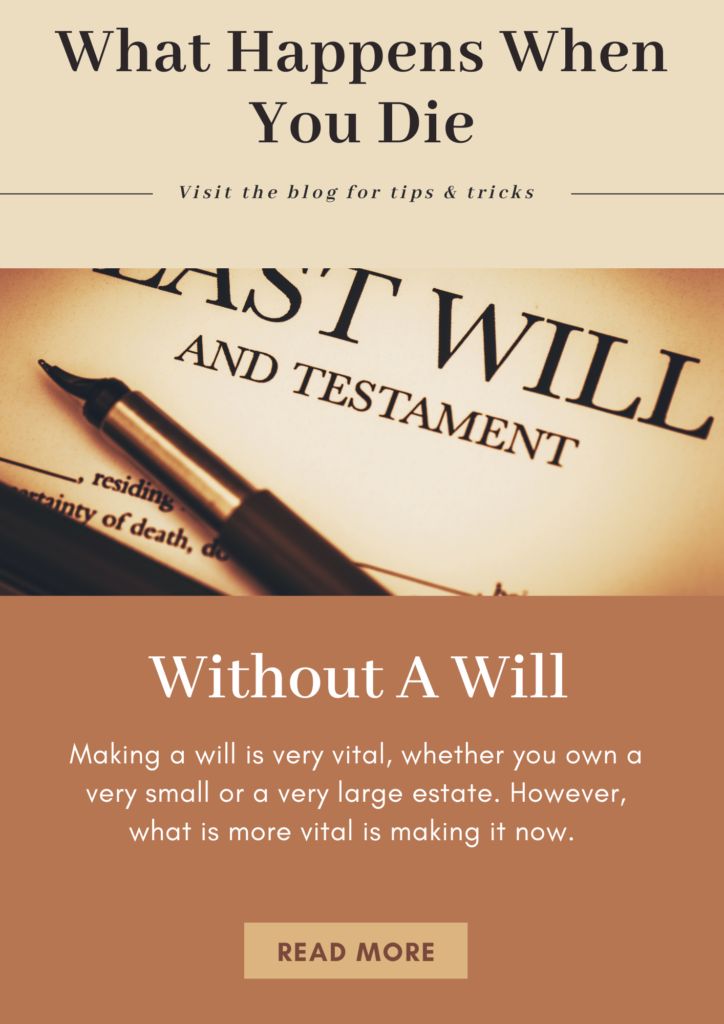
Death remains the inevitable end of all men. As much as you have some level of control over your quality of life, you also have a say over your quality of death. This is the ultimate purpose wills serve. Keep reading to learn what happens when you die without a will.
When the clock stops ticking on your life and death approaches, whether or not you make a will says a lot. It dictates how the properties you have labored over the years to gather will be distributed among people who deserve it. Sometimes, it also dictates those who do not.
After you die Intestate, what next?
A person who dies after making his will dies testate. However, if you die without making a will, you have died intestate. When you die intestate, your property will be distributed based on the Intestacy laws of the state where you reside. This property includes securities, bank accounts, real property and other assets (tangible or intangible).
If you own real property located outside your state of residence, the relevant laws of intestate succession applies. in that state where the property is situated will govern the distribution of such estate.
The laws of intestacy vary from state to state but every state law follows a similar pattern. Intestacy is highly dependent on your marital status, whether or not you have children and the categories of other relatives you leave behind. In most cases, the rule of thumb is that your property will be distributed amongst your heirs.
Your heirs could include your surviving parents, spouse, children, uncles or aunts, siblings, nephews, nieces among other relatives (either close or distant). Where no relatives survive you, your entire estate goes to the state, no matter any contractor desire you had while alive. Marriage and your other relationships modify the rule on a case-by-case basis, as follows:
- Intestate, Single and Childless: If you die without a will, a child and a spouse, your entire estate will devolve on your parents, if they are both living. If only one of your parents survives you, your estate will be shared among your siblings (full or half) and that surviving parent.
After you die Intestate, what next? contd….
However, where both parents are dead, then your entire estate will devolve on your siblings in equal shares. If you have neither surviving parents nor siblings (or their descendants i.e your nephews and nieces), then a half of your estate will devolve on your maternal relatives and the other half, to your paternal relatives.
- Intestate and Single but with Children: Your entire estate will be distributed among your children equally. If any of your children predeceases you but has descendants (i.e your grandchildren), the share of that child will go to those grandchildren.
- Intestate but married: This largely depends on the ownership of your property. Where your property is marital/community, the rule is that your estate will either devolve entirely on your surviving spouse. Where it is your own separate property, then it will be split between your surviving spouse, siblings and parents.
What Happens When you Die without a Will
If you have children with your surviving spouse, then the entire estate devolves on the surviving spouse. If not, your spouse will get up to half of the estate while the remaining half goes to your surviving children from another spouse.
- Intestate and In a Domestic Partnership: Although, not all states recognize domestic partnerships. Generally, if you die intestate with a surviving domestic partner, your domestic partner inherits the same, just like a surviving spouse. This largely depends on how you owned the property.
- Intestate but an unmarried Couple: Unmarried couples living together are hugely impacted by the intestate date of one of the couples. The laws of intestacy only recognize relatives. As such, unmarried couples cannot inherit the property of the other partner when the other dies intestate.
There has to be a will, which clearly expresses the wishes of the deceased partner to devolve some parts of his estate on the other one when he/she dies before the other partner can inherit from the estate.
All the above rules and distribution patterns might contradict your wishes and plans for your properties during your lifetime. However, since you did not make a will, you do not have a say over the distribution of your own estate.
You should Make Your Will, NOW!
The law does not mandate the making of a will on you. There are intestacy laws already in place for the administration of your estate when you die without making a will. However, the distribution patterns under these laws do not always reflect individual wishes for their estate.
The benefits of making a will are numerous and well known. However, the timing also matters a lot. The unpredictability that comes with death makes it very expedient to make your will, now. No matter how large or small your estate is, making a will affords you the following benefits:
- Reflecting your wishes: Through your will, your property is distributed strictly according to your wishes. Once you make your will, the states law of intestacy will not be deciding who gets what share of your estate.
- Selection of Heirs: A key aspect of every will is the apportionment of the part of the estate to different people. The Florida laws of Intestacy has a distribution pattern which limits your heirs strictly to your surviving relatives. Through your will, you can effectively set out those who will be entitled to inherit from you to include persons or entities outside the law of distribution pattern under the laws of intestacy. You can choose to include your pet, a charitable organization etc. among your heirs. You can also choose to disinherit certain people who will ordinarily be entitled to inherit.
- Reduction of Estate Taxes: Making a will affords you the opportunity to minimize the applicable estate taxes. The value of the portion of your estate given out to your relatives or to charity is removed from the total value of the estate for tax purposes.
You Should Make Your Will, Now! contd….
- Appointment of Fiduciaries: Where you do not make a will, the court can appoint anyone as a fiduciary of your estate, including a creditor of such estate. However, in your will, you can appoint fiduciaries including personal representative(s) who will manage your estate, trustees and guardians. However, such fiduciaries have to be qualified under the laws of Florida.
- Creation of a Trust: One of the huge benefits in making a will is that you can create a testamentary trust. Testamentary Trust is any trust created in a will. It is arguably the best method of handling your individual estate, irrespective of the size.
Creation of a testamentary trust has a whole lot of tax advantages. Beyond that, it can be used to make provisions for any of your beneficiaries. This could include a charity, individual or other multiple persons. By creating a testamentary trust, you can make precise directions as to how the trust assets will be managed.
Most importantly, testamentary trusts afford you a lot more control than when it is not created.
- Care of Minor Children: One of the most vulnerable groups upon your death is the minor children you have. A will gives you the chance to nominate a guardian to take care of your minor children. You can also make provisions for other dependents for any reason. There is only one major requirement you have to fulfil in nominating a guardian for your minor children and other dependents. The guardian should have the capability of taking care of the minor or the dependent.
- Prevention or Reduction of Uncertainties: By default, certain uncertainties arise upon your death as to the administration of your estate. Florida laws of intestacy have a number of rules targeted at resolving these uncertainties. However, a will remains the best option to prevent or reduces these uncertainties.
- Reduction of Probate bottlenecks: The existence of a will hugely reduce the bottlenecks involved in the probate process. As such, a lot of time will be saved in the probate process just because you made a will.
- Foreclosure of unnecessary legal challenges: There are a number of potential legal challenges that could arise out of the administration of your estate under the intestacy laws. This can come in the form of a relative that has not been a part of your life. Could also be someone whom you were not in good terms with while alive insisting on inheriting your estate. Having a will forecloses all of this.
Related Post: Why you Should Re-Evaluate Your Policies

Key Takeaways (What Happens When You Die Without a Will)
Making a will is very vital, whether you own a very small or a very large estate. However, what is more vital is making it now. This is because tomorrow is not promised for anyone. You might not live up to the period you envisaged to make the will. You therefore die intestate and practically leaving all your fortune to nobody!
However, if you make a will irrespective of your current position in life, you can always alter it. Especially when you witness landmark life changes which necessitate an amendment of your will. This includes childbirth, divorce, separation, marriage etc.
You should combat your procrastination and finally accept death as an inevitable experience. The overwhelming ambience needed to actually prepare your will may also deter you from making your will. To overcome this, you can simply talk to an estate planning attorney with cognate experience in drafting of wills. This person should also have a sharp understanding of the relevant state laws. This will assist you in designing your random wishes for your estate into a binding legal document made in accordance with state laws.
Action Step
If you are looking to get more information on creating or updating your will we can help. Our dedicated law firms are located all over the United States so regardless of what state you are in one of our attorney’s will be able to advise you on that state law. Get the peace of mind you and your family deserve. Click this link to learn more.
If you have any questions please leave them in the comments below. We will do our best to answer them.
Cheers!






